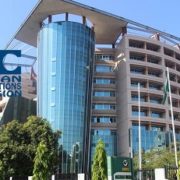By Chinedu James
A recent report on worldwide broadband speed across 200 countries released by Cable revealed that Nigeria slipped down despite efforts made by the authorities to improve connectivity across the country.
According to the report, Nigeria fell 57 places from its 95th position in 2017 to 152nd on the rankings. The parameter for the analysis was achieved knowing how long it would take to download a 5GB HD movie using its mean average download speed. Nigeria’s mean average reads 1.86 against 3.15 recorded last year and it will take about 6 hours, 7 minutes and 38 seconds to download a 5GB HD movie.
Madagascar, Kenya, South Africa, Cabo Verde, Ghana, Zimbabwe, Rwanda, Namibia, Burundi, Mauritius, Uganda, Zambia and Tanzania were African countries who topped Nigeria, Africa’s largest economy.
The data was collected for the second year in a row across 12 months up to 29th of May this year by M-Lab, a partnership between New America’s Open Technology Institute, Google Open Source Research, Princeton University’s PlanetLab and other supporting partners, and compiled by Cable.
Nigeria continues to struggle with broadband penetration.
According to the Nigerian Communications Commission (NCC), broadband penetration is currently at 22%. Government plans to up the figure to 30% by year end.
The NCC had also revealed that out of the over 120,000 kilometers of metropolitan fibre networks needed across the six geo-political zones to achieve pervasive broadband penetration, only about 52,000 km of fibre optic cables have been deployed by mobile network operators (MNOs); representing a mere 43.3% as at April this year.
However, the regulator in collaboration with industry’s stakeholders and players has continued to draw up plans and strategies to strengthen and restructure broadband initiative in all 36 states of the federation.
The Cable report explained that larger less developed nations like Nigeria find it more difficult to get broadband pervasiveness.
“When it comes to internet provision, the situation varies both by country and region. Generally speaking though, you can apply the rule that the larger and less developed the nation is, the slower the internet access tends to be.
“The economy of Singapore, for example, relies heavily on digital infrastructure, while the country itself occupies a relatively small space. There is economic necessity, coupled with the relative ease of delivering high-speed connections across a small area.
“Conversely, the economy of Chad suffers from geographic remoteness, drought and turmoil, with agriculture as its chief industry. It is also vast. There is therefore arguably no pressing economic necessity for high-speed internet, while the difficulty of delivering it would almost certainly exceed Chad’s GDP,” the report stated.
The report further revealed that Singapore, Sweden, Denmark and Norway who topped the rankings held a common ground with each of the countries focusing on FTTP (fibre to the premises) also known as fibre to the home available to over 40% of their respective population.





























